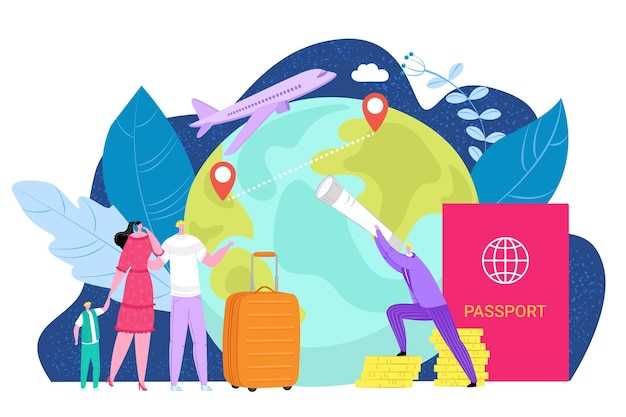
Embarking on a journey to new and exotic lands is an exhilarating experience that opens the door to endless possibilities and unforgettable memories. But what if each adventure could also leave a lasting impact, not just on your own life, but on the lives of others as well? Imagine harnessing the transformative power of travel to not only explore the world but also to contribute positively to the communities you visit. This is where the enchanting concept of volunteer tourism comes into play, offering a unique opportunity to make a meaningful difference while immersing oneself in the intricate tapestry of foreign cultures.
Volunteer tourism, also known as service travel, is a growing trend that has captivated the hearts of countless travelers seeking to break away from the conventional tourist experience. It encompasses a wide range of activities, from participating in community development projects to wildlife conservation initiatives, and everything in between. The essence of volunteer tourism lies in its ability to foster empathy, ignite passion, and forge connections across borders. By stepping outside the realm of being mere spectators to a foreign culture, individuals can actively engage in creating positive change.
Embracing the adventure of volunteering abroad means embracing the unknown, as each experience is as unpredictable as it is rewarding. It entails venturing beyond the comfort zone, embracing challenges, and discovering a world that is far removed from the glossy pages of travel magazines. Far away from the bustling tourist hotspots, volunteer tourism takes participants to obscure corners of the globe, where the true essence of a destination converges with the determination to make a difference. It is in these off-the-beaten-path locations that the intricate beauty of local communities unfolds, offering a glimpse into the resilience, kindness, and unyielding spirit of individuals who defy adversity every day.
Understanding the Concept of Volunteer Tourism
Exploring the essence of participating in volunteer tourism ventures provides a unique opportunity to delve into a different way of travel that goes beyond the traditional concept of tourism. This section aims to shed light on the fundamental principles behind volunteer tourism and its potential to create a meaningful and sustainable impact for both the destination and the individuals involved.
Appreciating Contributions beyond Monetary Value
At the core of volunteer tourism lies the recognition of alternative forms of wealth beyond financial capital. Volunteer tourists understand that their contributions can go beyond monetary donations and instead focus on offering their time, skills, and knowledge to support local communities and address specific needs. By valuing non-material resources, volunteer tourism fosters a deeper sense of unity and connection with the local culture and people.
Empowering Local Communities
One key aspect of volunteer tourism is its emphasis on community empowerment. Instead of relying solely on external aid, volunteer tourists actively engage with local communities to identify their needs, goals, and aspirations. Through collaborative efforts, volunteer tourism enables local communities to develop sustainable solutions to their own challenges while fostering a sense of ownership and pride. This approach ensures that the impact created is long-lasting and beneficial, enabling local communities to thrive even after volunteers have departed.
By understanding the underlying concept of volunteer tourism, individuals can fully grasp the transformative potential it holds for both themselves and the communities they visit. It goes beyond the ordinary tourist experience, providing an opportunity for personal growth, cultural exchange, and making a lasting positive impact.
Choosing the Perfect Volunteer Program for Your Ideal Experience
When embarking on a journey to make a difference abroad, it is essential to select the volunteer program that aligns with your personal goals and values. With a plethora of opportunities available, finding the perfect fit can be overwhelming. This section will guide you through the process of choosing the right volunteer program for you, ensuring a meaningful and fulfilling experience.
Begin by evaluating your interests and passions. Consider the causes and issues that ignite your enthusiasm – whether it be environmental conservation, education, community development, or healthcare. Identifying your specific interests will help narrow down the array of volunteer programs available and allow you to choose one that resonates with you on a deeper level.
Next, consider the location. Think about the regions or countries that evoke excitement and curiosity within you. Do you have a preference for a specific culture or environment? Are you drawn to remote areas or bustling cities? Reflecting on these preferences will help you determine the ideal location for your volunteer experience.
Another crucial aspect to consider is the duration of your commitment. Volunteer programs vary in length, ranging from a few weeks to several months. Assess your availability, time constraints, and personal commitments before committing to a program. Additionally, factor in the time required for orientation and training, as these may vary depending on the organization.
Take into account the level of support provided by the organization. Look for volunteer programs that offer comprehensive support before, during, and after your placement. This can include pre-departure information, on-site orientation, local staff support, and debriefing sessions. Having a reliable support system will enhance your overall experience and ensure that you feel well-equipped to make a meaningful impact.
| Factors to consider: | Description: |
|---|---|
| Budget | Evaluate your financial resources to ensure a program that fits your budget. |
| Skills and qualifications | Assess your expertise and determine if the program requires any specific skills. |
| Accommodation and living conditions | Consider the type of accommodation and living conditions that are suitable for you. |
| Language requirements | Evaluate the language skills needed to effectively communicate in your chosen destination. |
Finally, thoroughly research the reputation and credibility of the organization offering the volunteer program. Read reviews, testimonials, and reach out to individuals who have previously volunteered to gain insights into their experiences. It is essential to ensure that the organization operates ethically and is committed to sustainable and responsible volunteering practices.
Choosing the right volunteer program is a crucial step towards making a positive impact while immersing yourself in a new culture. By taking the time to consider your interests, location preferences, duration, support, and organization credibility, you will be well on your way to an enriching and rewarding volunteer experience.
Preparing for an Overseas Volunteer Adventure
Embarking on a meaningful journey to support communities in need abroad requires careful planning and thorough preparation. In this section, we will guide you through essential steps to ensure a successful volunteer trip while promoting cultural understanding and sustainable development.
Research and Choose a Suitable Destination
The first step in preparing for a volunteer trip abroad is to research and select a destination that aligns with your interests and objectives. Consider factors such as the social, economic, and environmental contexts of various countries, as well as the local languages, cultures, and customs. Identify organizations or projects that focus on causes you are passionate about, where you can make a genuine difference.
Learn about the Culture and Context
Understanding the local culture and context is crucial for a meaningful volunteer experience. Familiarize yourself with the history, traditions, and customs of the community you will be working with. Educate yourself about the challenges and issues they face, as well as the current initiatives being implemented to address them. This knowledge will enable you to approach your volunteer work with empathy and respect.
Create a checklist of necessary preparations, including obtaining the required travel documents, visas, and vaccinations. Research the local climate and pack appropriate clothing and essentials. It is also important to inform your family and friends about your travel plans and provide them with emergency contact details in case of unforeseen situations.
- Research and choose a suitable destination
- Learn about the culture and context
- Create a checklist of necessary preparations
Maximizing the Potential of Your Volunteer Endeavors
When embarking on a meaningful journey abroad, it is essential to optimize the extent of your contributions, ensuring a positive and lasting influence on the community you serve. By adopting strategic approaches and embracing your role as a catalyst for change, you can magnify the impact of your volunteer work in a multitude of ways.
Firstly, by actively engaging with local communities and individuals, you can foster authentic connections and gain a deeper understanding of their needs and aspirations. This connection allows you to tailor your efforts to meet specific requirements and create sustainable solutions that leave a significant and meaningful mark on the lives of those you support.
In addition to engaging directly with communities, collaboration with established local organizations can significantly enhance the effectiveness of your endeavors. Partnering with these organizations offers the advantage of their extensive knowledge and experience, providing invaluable guidance and support that amplifies the overall impact of your volunteer work. Moreover, such partnerships foster long-term relationships and empower local communities to continue benefiting from your efforts even after your departure.
Furthermore, adopting a proactive approach towards skill-building is critical in maximizing the positive impact of your volunteer work. By constantly seeking opportunities to acquire new skills or enhancing existing ones, you increase your capacity to address complex challenges more effectively. This proactive mindset allows you to take on more significant responsibilities and contribute towards sustainable development in a comprehensive and long-lasting manner.
Lastly, understanding and respecting the local culture and customs is imperative in ensuring the positive impact of your volunteer work. By immersing yourself in the local way of life, you demonstrate a genuine commitment to understanding and appreciating the community you serve. This cultural sensitivity encourages mutual respect and trust, enabling you to navigate potential challenges and differences more seamlessly, resulting in a more positive and sustainable outcome for all stakeholders involved.
In conclusion, by actively engaging with communities, collaborating with local organizations, investing in skill-building, and embracing cultural sensitivity, you can maximize the potential and effectiveness of your volunteer work. These strategic approaches elevate your contributions to a higher level, leaving a lasting positive impact on the communities you serve.
Challenges and Ethical Considerations in Volunteer Tourism
Exploring the complexities and dilemmas that arise in the realm of volunteer tourism, this section delves into the numerous challenges and ethical considerations that individuals must be mindful of when engaging in these endeavors. From potential negative impacts on local communities to cultural sensitivity, these aspects deserve careful attention to ensure a responsible and meaningful experience.
The Commodification of Volunteerism
One of the key challenges in volunteer tourism is the risk of commodifying altruistic acts. As the popularity of volunteer tourism grows, there is a danger of transforming genuine acts of service into a marketable commodity. The focus may shift from making a difference to meeting the expectations of tourists, potentially underestimating the true needs and complexities of the local communities being served. This ethical concern calls for a critical examination of motivations and intentions when engaging in volunteer tourism.
Unintended Harm and Dependency
While the intentions behind volunteer tourism are often noble, there is a potential for unintended harm to local communities. Volunteers may unknowingly perpetuate dependency, inhibiting the development of self-sustaining initiatives. Additionally, the influx of volunteers may create imbalances in the local economy, leading to inflation and increased inequality. These concerns highlight the importance of long-term planning, community engagement, and sustainable development practices in volunteer tourism projects.
- Ensuring Cultural Sensitivity
- Respecting Local Customs and Beliefs
- Addressing Power Dynamics
Another crucial aspect to consider in volunteer tourism is the need for cultural sensitivity. Volunteers must take the time to understand and respect the local customs, traditions, and beliefs of the communities they are working with. This requires a willingness to adapt and learn from the local culture, rather than imposing Western ideals and practices. It is also important to acknowledge and address power dynamics that may exist between volunteers and local communities, ensuring that the volunteer experience is one of collaboration and empowerment rather than paternalistic intervention.
In conclusion, volunteer tourism presents both challenges and ethical considerations that should not be overlooked. By approaching these experiences with mindfulness and a commitment to responsible and sustainable practices, individuals can strive to make a positive and impactful contribution while traveling abroad.
Personal Growth and Learning Opportunities in Volunteer Travel
Embarking on a volunteer travel experience goes far beyond simply exploring new destinations and immersing oneself in different cultures. It offers a myriad of opportunities for personal growth and the acquisition of valuable knowledge and skills. Joining a volunteer program allows individuals to challenge themselves, broaden their perspectives, and develop a deeper understanding of global issues.
Engaging in volunteer travel fosters personal growth by encouraging individuals to step out of their comfort zones and face new challenges. As volunteers work towards making a meaningful impact in local communities, they often encounter diverse situations that require adaptability, resilience, and problem-solving skills. This hands-on experience helps develop confidence and self-assurance, empowering volunteers to navigate unfamiliar environments and overcome obstacles.
Furthermore, volunteer travel offers unique learning opportunities that can enhance one’s knowledge and skill set. By actively participating in projects focused on areas such as education, healthcare, environmental conservation, or community development, volunteers gain insights into specific fields and gain practical experience in their desired areas of interest. They also have the chance to learn from local experts, community leaders, and fellow volunteers, fostering a rich exchange of knowledge and ideas.
In addition to acquiring practical skills and knowledge, volunteer travel enables personal growth through increased cultural competence and global awareness. Living and working alongside local communities allows volunteers to immerse themselves in different ways of life and gain a deeper understanding of cultural nuances, values, and traditions. This intercultural exchange fosters empathy, tolerance, and a broader worldview, making individuals more globally conscious and socially responsible.
Ultimately, engaging in volunteer travel presents a transformative journey where personal growth and learning opportunities abound. It allows individuals to not only make a positive impact on the communities they serve but also to develop essential skills, expand their knowledge, and gain a deeper understanding of the world around them.











